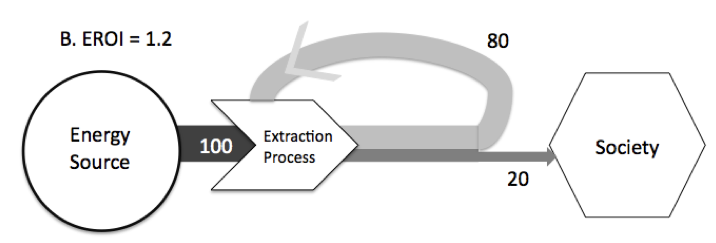"The true value of energy to society is the net energy, which is that after the energy costs of getting and concentrating that energy are subtracted.” - H.T. Odum (1973)
To reduce Odum’s assertion to a pithy phrase—it takes energy to get energy – and for the past 150 years society has accessed enormous quantities of energy in the form of fossil fuels at a very low cost. Early U.S. oil production provided 100 barrels of oil for every barrel spent in getting that oil (Cleveland 2005), while traditional fuel sources (e.g. biomass) returned much less. This huge increase in net energy enabled society to build cities, increase crop yields, build cars, etc…
Today, the circumstances are different, as nearly all of the easy-to-find and easy-to-produce oil wells have been found and produced. For example, Ghawar, the world’s biggest oil field, was discovered in 1948, and even with all of the advances in seismic technology over the past 60 years, nary an oil well of nearly the same magnitude has been found.
What has become very clear over the past decade and especially the past month is that the energy cost of getting oil has increased. We need only to compare the wooden oil derricks used to produce the fields of the early 20th century to that used currently in the Gulf of Mexico – two billion dollar ultra-deep water platforms.


As the energy cost of getting energy increases, the amount of net energy provided to society from an oil field decreases. Take, for example, the following two hypothetical societies (Figures 3 and 4). Society A has an energy source that can be extracted at an EROI of 18. Society B has an energy source that can be extracted at an EROI of 1.2. In this example both societies extract 100 units of energy, but due to the different EROIs with which that energy is extracted, the amount of net energy provided to society is much different. Society A must invest six units of energy to maintain the energy infrastructure needed to extract 100 units of energy, while Society B must invest 80 units of energy. The end result is that society A has 96 units of net energy to allocate to whichever means it desires, while society B has only 20 units of net energy.

Figure 3. Net energy flows with a high extraction EROI. Numbers calculated using the following equation: Net Energy = Gross Energy * (EROI-1/EROI).

Figure 4. Net energy flows with a low extraction EROI.
As oil becomes harder and harder to find and produce, the energy cost of getting energy will continue to increase, transitioning the world from the situation in Society A toward that of Society B. Take, for example, the current debacle in the Gulf of Mexico. Even if we are able to fix the well expediently and extract any remaining oil, the energy costs of this well will likely be greater than the energy gains.
As long as the amount of energy needed to get energy continues to increase, the supply of net energy to society will decrease, despite that fact that the gross supply of oil may stay constant or even slightly increase in the short term. This means that in the future the amount of energy available for discretionary purposes, i.e. building houses, roads, and schools, will decrease, as more and more energy must be dedicated to, for example, the construction of oil pipelines, ultra-deepwater rigs, the energy to mitigate oil spills, etc... As Joseph Tainter noted in his book, the Collapse of Complex Societies , "Eventually the point is reached when all the energy and resources available to a society are required just to maintain its existing level of complexity.”
So when press releases are made about new discoveries, ask yourself: “how much energy will be used to get that energy, or what will be the energy profit?”
Nashville People in BusinessThe wages of complexity
No comments:
Post a Comment